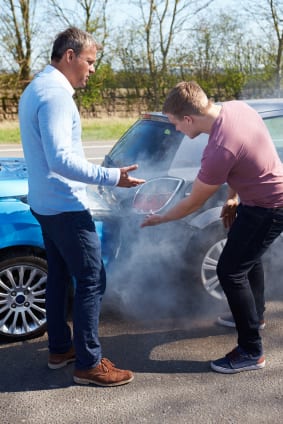Car crashes are truly terrible. No one enjoys them. Most of them result in injuries. Sometimes those injuries are very serious. I guess that is what we should expect when we agree to drive large metal objects all around at high rates of speed. Accidents are bound to happen. Perhaps the only thing worse that having your car hit by another car is being the one who is doing the hitting. When you are the cause of an accident, it can feel even worse. People judge you. They think you must be a terrible driver or perhaps you are stupid. The reality is that the vast majority of people will be in multiple car accidents in their lifetimes and almost everybody will eventually cause a crash. The more time you spend driving, the more your odds go up. When you caused the crash, not only do you get the injury and the stress, you also get the financial burden of the whole thing. They can be extremely expensive. Luckily, you probably have insurance to help with that, but there are still large costs associated with being the at-fault party. The first of which is that you may be issued a citation. Those can range from only $50 or $60, all the way up to several hundred dollars. The bigger worry is that your insurance premiums will go up. Causing an accident has potential to stay on your driving record for several years. Paying more for insurance every month for several years can cost you thousands. If you have recently hit another driver with your car, there a few things that you should know.
The first tip is one that may seem counterproductive. If you get into a very minor crash where there is no damage at all, the victim may not even care to exchange insurance information. If this is the case, do not get a police report. That would be silly because you may be cited for an accident that will not even result in an insurance claim by either party. However, if the crash causes damage, you too will want a police report. The possibility of receiving a citation is a small price to pay in exchange for making sure that stories do not change. Call the police so you have a written, credible, third party statement to rely on later. Also remember to take pictures of the scene and anything and everything that may have contributed to causing the accident. You do not want the damages that your insurance company may have to pay to ever be blown out of proportion, for that reason, make sure to keep a journal and adequately document everything in an effort to protect yourself.
Another thing that you must be aware of is the fact that your insurance premiums are almost bound to increase. The more that your insurance company ends up paying out because of you, the harder that they will try to recoup their money from you. Even switching carriers may not help you because the new provider will be able to see your driving record as well. The positive note here is that your premiums will not go up for an awfully long time. Typically the earliest that you could notice a change is at the end of your policy period. Most of the time it takes multiple policy periods to notice an increase in premiums because a liability claim by a victim can take up to a few years to complete. Your insurance will likely not dinge you until they actually pay something out. If there is no liability claim, and all you have is your own property damage, the increase might be very minor. One thing you can do to combat this is to opt for higher deductibles on your next term. Now that you have been in an accident, you are more likely to be extremely careful; perhaps you can save money by taking on just a bit more risk in the form of a higher deductible.
The very best thing to do after an auto accident is to touch base with the best injury lawyer that you can find. Then recommit yourself to safe driving so that you can get back to having a clean driving record. If it was your first accident in a long time, you may want to switch to an insurance provider with an accident forgiveness program so that one rare crash will not affect you.
This article is offered only for general information and educational purposes. It is not offered as and does not constitute legal advice or legal opinion. You should not act or rely on any information contained in this article without first seeking the advice of an attorney.




